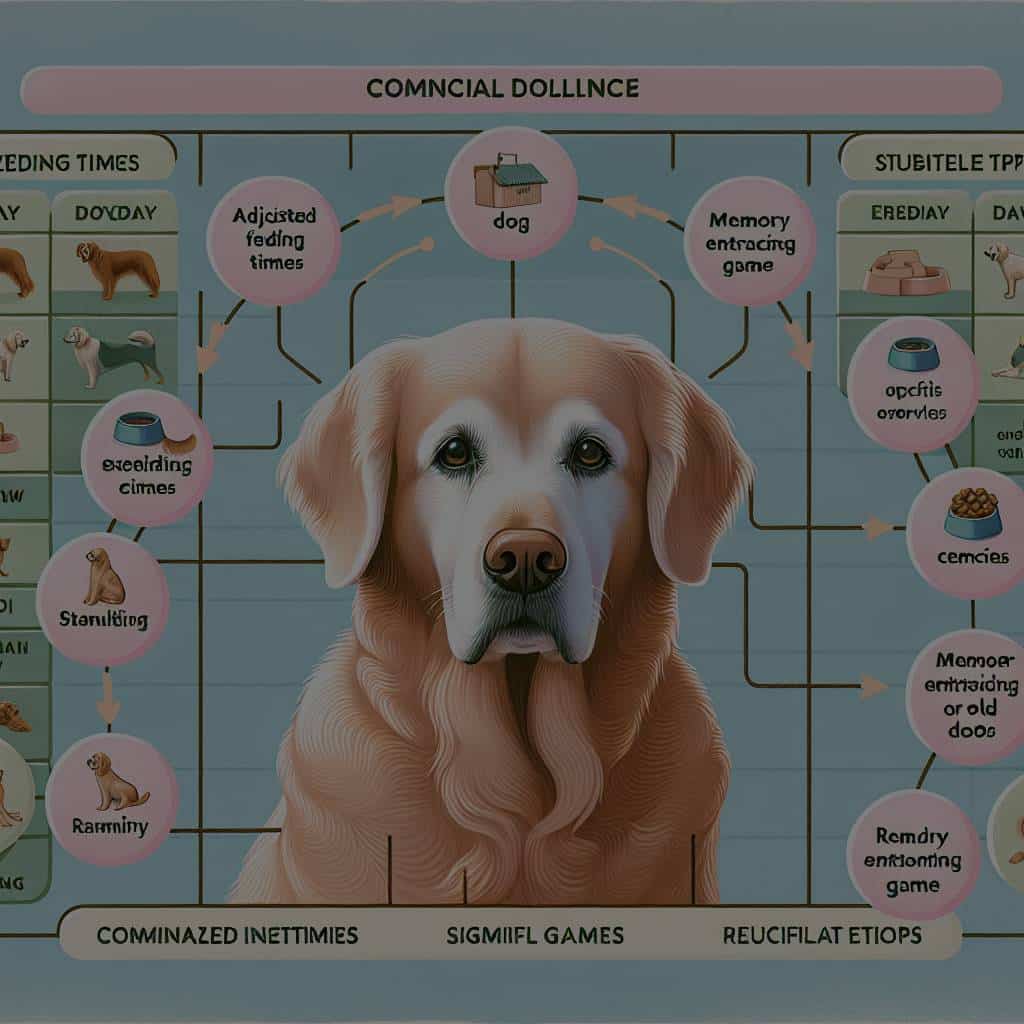How to Create a Daily Routine for a Senior Dog with Cognitive Decline?

In the life of a pet owner, there is perhaps no experience more heart-wrenching than observing the gradual decline of a beloved canine companion. This decline may manifest in a variety of ways, but for many senior dogs, cognitive dysfunction or Canine Cognitive Dysfunction (CCD), a condition similar to dementia in humans, is a common challenge. Let’s delve into this topic in detail, learning how to identify the signs of CCD, the role of a veterinarian, and the importance of a healthy diet, regular exercise, and mental stimulation for a senior dog with cognitive decline.
Recognising the Signs of Cognitive Dysfunction in Dogs
Senior dogs are more than just lovable creatures; they’re also seasoned veterans of life with a wealth of experiences under their collar. As they age, dogs may exhibit certain behavioral changes indicative of cognitive decline. It’s important to recognize these signs to provide the necessary care and attention.
A découvrir également : What Are the Keys to Success in Training a Dog for Competitive Obedience?
Many dogs with CCD show a decreased interest in activities they once enjoyed, such as play, walks, or social interactions. They might also develop sleep disturbances, becoming restless at night and lethargic during the day. In certain cases, dogs may suffer from disorientation, wandering aimlessly or appearing lost in familiar surroundings. House soiling, despite being house-trained, is another notable symptom.
These signs can be subtle and gradual, making them easy to miss or misconstrue as just normal aging. Hence, it’s crucial for pet owners to be attuned to their dogs’ behaviors and consult a veterinarian if any concerns arise.
A voir aussi : How to Safely Trim the Nails of a Small Pet Like a Hamster or Gerbil?
The Role of a Veterinarian in Managing CCD
When it comes to the health and wellbeing of your senior dog, a veterinarian is an indispensable ally. If you suspect your dog may be suffering from cognitive decline, don’t hesitate to seek professional help.
A veterinarian can conduct a thorough physical examination and run various diagnostic tests to rule out other medical conditions that might be causing your dog’s symptoms. Once CCD is confirmed, a treatment plan can be designed to manage the condition and improve your dog’s quality of life.
Treatment might involve medication to slow the progression of CCD and manage symptoms. It could also include recommendations for dietary changes, supplements, and enrichment activities to keep your dog mentally stimulated. Remember, every dog is unique and what works for one may not work for another. Therefore, it’s important to maintain regular vet check-ups to monitor your dog’s response to treatment and make necessary adjustments.
The Importance of a Healthy Diet
A dog is only as healthy as the food it eats. This adage rings true, especially for senior dogs with cognitive decline. The food you feed your dog plays a critical role in managing cognitive dysfunction and maintaining overall health.
Dietary adjustments can be beneficial for dogs with CCD. Specific diets, rich in antioxidants and omega-3 fatty acids, have been shown to improve cognitive function in dogs. These nutrients protect the brain cells from damage and promote their health.
Speak with your veterinarian about a diet tailored to your dog’s specific needs. They might recommend specially formulated senior dog food, or suggest adding certain supplements to your dog’s normal diet. Don’t forget to provide plenty of fresh water, as dehydration can worsen cognitive issues.
The Power of Exercise and Mental Stimulation
Sedentary habits are not just a human problem; they can also contribute to cognitive decline in dogs. Regular exercise and mental stimulation are crucial components of a senior dog’s daily routine.
Physical exercise, like walks or playtimes, can improve blood flow to the brain and enhance cognitive function. Mental stimulation, on the other hand, can be achieved through puzzle toys, training exercises, and social interactions. These activities challenge your dog’s brain, keeping it active and engaged.
However, it’s important to consider your dog’s physical abilities and limitations. As dogs age, they may experience arthritis or other health issues that make certain activities difficult. Therefore, always adapt exercises to your dog’s comfort level and never force them into strenuous activities.
Creating a Daily Routine
Finally, a regular daily routine can have a significant impact on the health and happiness of a senior dog with cognitive decline. Consistency provides a sense of security and reduces confusion and stress for dogs with CCD.
Your routine might include regular feeding times, walks, playtimes, grooming sessions, and rest periods. It’s also beneficial to include regular training sessions to keep your dog’s mind sharp.
Additionally, consider incorporating a nightly routine to help alleviate nocturnal restlessness, a common symptom of CCD. This could involve a short walk before bed, a calming massage, or even a peaceful bedtime story.
Remember, patience and understanding are vital when caring for a senior dog with cognitive decline. There will be good days and bad days, but with love, compassion, and a good routine, you can help your furry friend navigate this challenging stage of life.
Incorporating Cognitive Training for Senior Dogs
Cognitive training plays a significant role in managing cognitive decline in senior dogs. It helps improve their mental agility, memory, and concentration. This, in turn, helps to slow down the progression of cognitive dysfunction and enhances their quality of life.
Cognitive training for dogs can be as simple as regular obedience training sessions using commands your dog is already familiar with. For instance, instructing your dog to sit, stay, or fetch can help stimulate their brain. These training sessions not only provide mental stimulation but also reinforce your bond with your dog.
Interactive toys and puzzles are also excellent tools for engaging your dog’s mind. These tools challenge your dog’s problem-solving skills and keep them mentally active. Hide and seek games or treat-dispensing toys can also be fun and rewarding for your dog.
Remember to always keep these training sessions short and fun. If your dog becomes frustrated or stressed, it’s best to stop and try again later. And don’t forget to reward your dog with praise and treats for their efforts. This will help keep them motivated and eager to participate in these sessions.
Providing Emotional Support and Comfort
No matter the amount of physical care and mental stimulation you provide, emotional support is crucial for a senior dog with cognitive decline. Dogs, like humans, need love, care, and attention. Providing emotional comfort can significantly improve your dog’s overall well-being and quality of life.
Spend quality time with your dog every day. This could involve cuddles on the couch, gentle massages, or simply sitting by their side. It’s important to remember that your dog may become more sensitive or anxious as they age. Therefore, your patience, understanding, and reassurance can go a long way in helping them feel safe and loved.
Also, ensure your dog has a comfortable and quiet space to rest. Older dogs may need more sleep than younger ones, and disruptions can cause stress and disorientation. Consider providing a cozy bed in a quiet part of your house where they can rest undisturbed.
Conclusion
Caring for a senior dog with cognitive decline can be challenging, but with love, patience, and proper guidance, it is manageable. By recognizing the signs early and consulting with a veterinarian, you can create a care plan tailored to your dog’s needs.
A healthy diet, regular exercise, cognitive training, and emotional support are key ingredients in this care plan. While each dog is unique, maintaining a consistent daily routine can provide comfort and help manage symptoms of CCD.
Remember, cognitive decline doesn’t diminish the love and companionship your senior dog offers. With your support, your furry friend can navigate the golden years with dignity and a good quality of life. After all, they are not just pets, they are valued members of the family.
